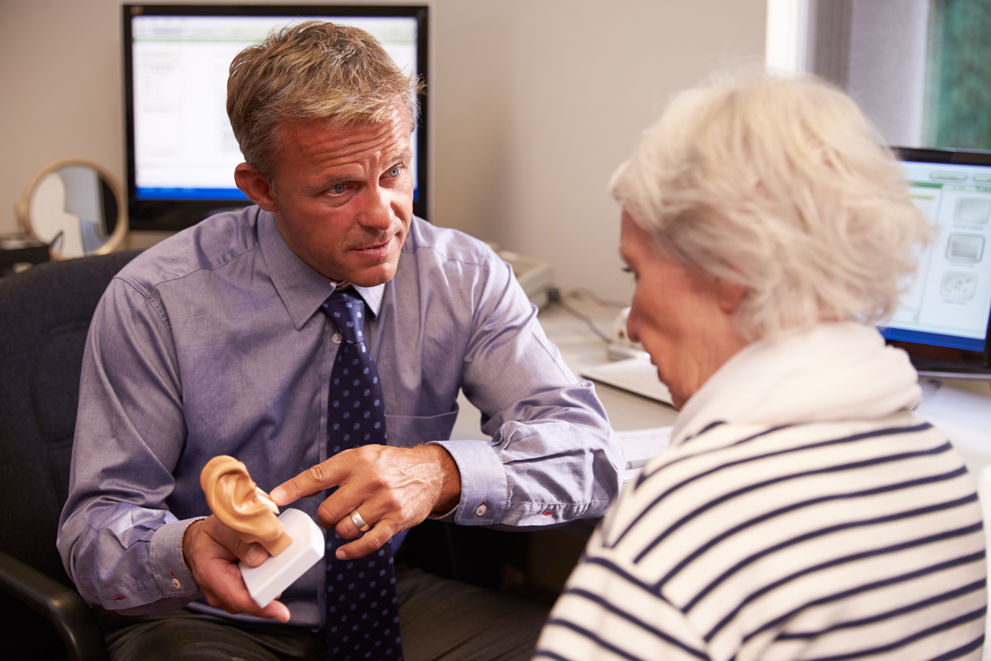Age Related Hearing Loss
Aging is the most common natural cause of hearing loss – also known as Presbycusis.
In the UK, 71% of people over the age of 70 have a hearing loss, yet only about 40% of people who need hearing aids have them.
As we get older, degeneration in the inner ear and along the nerve pathways to the brain can impact our hearing. Hair cells in our inner ear translate the sound waves our ears collect and send electrical signals to our brain for it to interpret as recognizable sound. Because hair cells do not regenerate or regrow, any hearing loss we experience from damage to them from noise exposure, medical conditions or genetics perhaps, is permanent.

The symptoms of age related hearing loss
Because Presbycusis occurs gradually, many people don’t recognise the symptoms and it often takes those around them to highlight that there could be a problem that needs identifying or treating.
Common symptoms to look out for are:
- People seemingly mumbling so you can hear them but you can’t understand them.
- Conversations that are difficult to understand, especially when in noisy surroundings.
- Difficulty hearing higher pitched sounds like a phone ringing or birds singing.
- Men’s voices being easier to understand than those of women or children.
- A constant or intermittent ringing or buzzing sound in your ears.
- Finding it hard to hear when on the phone.
- Intolerance to loud sounds.
- Asking people to repeat themselves.
- Needing to turn up the TV volume.

Preventing age related hearing loss
It’s not possible to completely prevent age related hearing loss, especially if it’s a genetic or hereditary loss, but there are certainly steps you can take in your lifestyle to reduce the risks:
- Check the medications you’re taking and if there is any link to hearing loss, ask your GP to prescribe an alternative.
- Conditions like high blood pressure or diabetes can contribute to hearing loss, so if you think you are suffering from these, don’t leave them untreated.
- Protect yourself from exposure to loud noises (at 85 decibels or more) that can permanently damage your hearing, by wearing ear plugs or ear protection around noisy equipment, or reducing the volume of your music. If you can’t reduce the noise or protect your ears, move away from the loud noise.

Is it dangerous to ignore Hearing loss?
Untreated hearing loss can affect your cognitive health and can increase the risk of social isolation, depression and injury-causing falls. When your ability to hear gets worse, your brain receives less stimulation that it would in normal circumstances, because it’s not working to identify different sounds and situations. Over time, this lack of brain exercise can lead to memory loss and even dementia. Find out about hearing loss and dementia.

The good news is it’s treatable
It’s not all doom and gloom however, as age related hearing loss is highly treatable and hearing aids work well for most older adults with mild to moderate hearing loss. And for those with more severe loss, cochlear implants are an increasingly popular option.
It’s easy to find out if you’re suffering from age related hearing loss. Simply book a hearing test with your local Audiologist who will test your hearing in the comfort of your home.
Once your Audiologist knows the level of your loss, they’ll be able to talk through your options for clearer hearing with you. Finding out you’re experiencing hearing loss and receiving treatment can rarely reverse damage, but it can:
- Make your life easier.
- Slow down your hearing loss by knowing and addressing the root cause.
- Help your mental sharpness, as hearing loss can impair the brain’s ability to process sound and recognises speech.
- Help the onset of dementia and Alzheimer’s disease, according to recent studies.